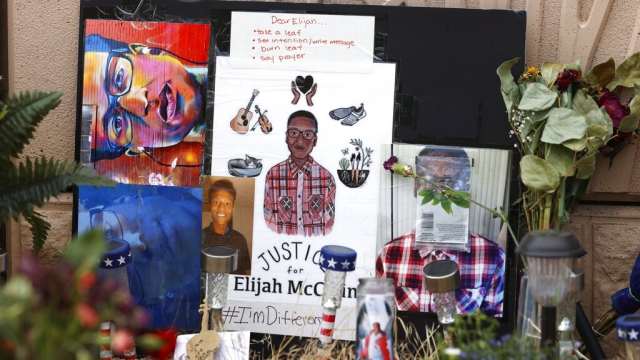The criminal trial has begun for a pair of Colorado paramedics whose patient died in 2019 after they sedated him with ketamine following a rough police altercation.
Jeremy Cooper and Pete Cichuniec both pleaded not guilty to criminally negligent homicide, manslaughter, and assault charges in connection with Elijah McClain’s death in Aurora, Colorado.
McClain, 23, was walking home from his neighborhood convenience store in August 2019 – wearing a black ski mask – when he was confronted by three Aurora police officers who were responding to a 911 call in which the caller described McClain as looking “sketchy.”
“He might be a good person or a bad person,” the caller said.
McClain was not committing any crime when police approached him.
Body camera footage captured McClain saying he was listening to music when officers first stopped him for looking “suspicious.”
The officers forced McClain to the ground. One officer restrained him with a carotid hold — a technique that cuts blood flow to the brain — before paramedics were summoned to the scene.
According to an amended autopsy, McClain died of complications of ketamine administration following forcible restraint.
Although the local district attorney declined to criminally charge any of the first responders involved in the incident, protests following the death led the state’s attorney general to convene a grand jury.
All five first responders were criminally charged in 2021 in connection with McClain’s death.
In October of this year, a jury convicted one officer, Randy Roedema, of criminally negligent homicide and third-degree assault for his role in the incident.
The two other police officers involved were acquitted by juries this fall.
Why paramedics administered ketamine
Internal interrogation videos obtained by Scripps News show Cichuniec and Cooper explaining why they administered the powerful sedative to McClain after the police altercation.
The two said they agreed to use ketamine on McClain because he appeared to them to be in a state of “excited delirium,” a controversial term then used to describe someone who was not in control of their body or not in their right state of mind.
The term is now rejected by many medical professionals as a legitimate medical diagnosis.
Cichuniec said he felt ketamine would be an appropriate drug to administer, according to the Aurora Fire Department’s protocol, because of McClain’s “agitated state.”
“(We walked) into the scene to find a patient down on the ground, handcuffed, fighting off APD officers,” said Cichuniec in an interview with an investigator in 2019.
Cooper described McClain as sweating profusely. He told an investigator that McClain seemed to be “fairly combative and aggressive with the officers.”
An independent review of the incident commissioned by the city of Aurora and published in 2021 found the paramedics “stood back and did not render aid to Mr. McClain for several minutes, until a paramedic administered ketamine. During this period, Mr. McClain could be heard moaning, gagging, responding to the officers’ statements, exclaiming in pain, and struggling to breathe,” the report concluded.
“It was only after the administration of ketamine that medical personnel conducted a hands-on assessment of Mr. McClain, took vital signs, or otherwise evaluated his condition beyond simple observation,” the report said.
Though Cooper ultimately injected the drug into McClain’s deltoid, Cichuniec told investigators it was his first time deciding to administer the drug.
Ketamine in Colorado
For several years, Colorado paramedics were permitted to administer ketamine, a powerful sedative, to agitated patients outside of a hospital setting. In Colorado, the practice required a special waiver from the state health department.
Using the drug for this purpose is not FDA-approved.
According to a Scripps News investigation, paramedics in nearly every state have been permitted to administer the drug to calm agitated people outside of a hospital setting in recent years, but Colorado’s health department eliminated the practice following various controversial incidents involving the drug in the state, including McClain’s death.
In 2021, Colorado Gov. Jared Polis also signed a law that significantly restricted when and how the drug could be used by paramedics in the state outside of a hospital setting.
What is ketamine?
Ketamine is a dissociative anesthetic that has been widely used for several decades in various medical treatments.
The drug was approved by the Food and Drug Administration as an intravenous or intramuscular injection solution for "induction and maintenance of general anesthesia," but many medical professionals and researchers have found "off-label" purposes for the medication, including as a method to reduce pain, as a potential treatment for post-traumatic stress disorder and depression, and as a means of sedating an agitated person outside of a hospital.
While medical professionals insist the medication has a good safety profile, how the drug has been used in recent years — in scenarios in which a patient is described as agitated or combative — has raised questions among several patients and their loved ones, especially after it was linked to McClain’s high-profile death.
Scripps News recently investigated several other controversial cases, including the death of Jamie Britt, who received a dose of ketamine following a police altercation in Mount Pleasant, South Carolina, in which police held him in the prone position for several minutes.
The paramedics were not criminally charged in that case. However, court filings indicate the Charleston County government representing them agreed to a civil settlement in 2023 totaling $1.1 million. The Mount Pleasant Police Department also paid a $3 million settlement in 2020.
The trial for the paramedics accused in McClain’s death is expected to last several weeks.


